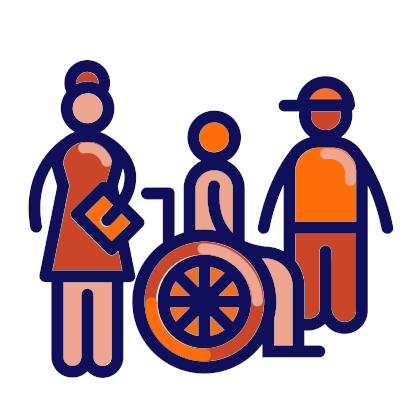Tackling discrimination

Schools can tackle discrimination by promoting democracy, respect for human rights and citizenship.
To ensure that all students’ needs are met equally, schools need to prioritise language and cultural competences, multiperspectivity in history and gender equality. In this way, students can acquire competences for democratic culture, to fulfil their potential in school as well as in society.
Facts & figures
Students with disabilities in Europe have higher early-school leaving-rates than their same-age peers.[1]
Black Caribbean students are three times more likely to be excluded from English schools than white pupils. [2]
A survey of nine EU countries showed that 33% of Roma students were in schools where most pupils were Roma, with 13% in Roma-only schools.[3]
What is discrimination?
Discrimination is treating a person badly or unfairly on account of a personal characteristic, such as national, ethnic or social origin, gender, language, religion, disability or sexual orientation.
There are two basic forms of discrimination:
- Direct discrimination – treating someone less favourably than you treat or would treat another person in the same situation, e.g., a school refusing to admit a student because they are Roma,
- Indirect discrimination – applying a provision, criterion or practice in the same way for all of a group which has the effect of unfairly disadvantaging people in the group who share a particular characteristic, e.g., a school uniform policy banning headgears for girls and boys may unfairly disadvantage Muslim girls and Jewish boys.
Discrimination can occur in almost any aspect of school life, from the attitudes and expectations of teachers to school rules and codes of conduct, selection and grouping practices, curricula, teaching methods and materials, changing facilities, career guidance, canteen food and the physical school environment.
Whatever form it takes – whether it be parallel school systems for different ethnic groups, concentrations of minority or disadvantaged children in the same school, or differential access to educational provision, it means a lower quality of educational experience for the students being discriminated against.
Why is tackling discrimination important at school?
Discrimination is a human rights violation. Article 14 of the European Convention on Human Rights contains a prohibition on discrimination with respect to any of the rights and freedoms guaranteed under the Convention. Article 2 of Protocol No.1 requires the state to ensure that all individuals have access to its formal educational provision.
“No person shall be denied the right to education.”[4]
“The enjoyment of the rights and freedoms set forth in this Convention shall be secured without discrimination on any ground such as sex, race, colour, language, religion, political or other opinion, national or social origin, association with a national minority, property, birth or other status.”[5]
Tackling discrimination is not simply a duty laid on schools by the European Convention of Human Rights, it is also important for student well-being and educational success. Children and young people who are treated unfairly or discriminated against are more likely to have:
- negative attitudes to school
- lower levels of motivation and academic achievement
- a higher risk of dropping out of formal education
- experience of bullying
- mental health problems.
Feeling different or ‘less’ than others can be an isolating experience. Over time it undermines an individual’s capacity for participation in society, e.g., their sense of self-efficacy, openness to other cultures and beliefs, tolerance of ambiguity and flexibility and adaptability - all of which lie at the heart of the Council of Europe Reference Framework of Competences for Democratic Culture.
Lack of opportunity due to discrimination in school also damages society. It intensifies social divisions, fuels xenophobia and intolerance and undermines social cohesion.
“States should adopt a combination of strong anti-discrimination measures and policies that promote more inclusive education systems where all children learn together. This is not a utopian project, but an achievable goal that can ensure more equal treatment of all children and, in the long term, improve social cohesion”[6]
What are the challenges?
One of the challenges facing the tackling of discrimination in schools is a lack of data. European-wide statistics specifically focused on discrimination in schools are scarce. Children with disabilities, for example, do not always appear in national statistics and may be ‘invisible’ to decision-makers, service providers and the public. Such children are particularly vulnerable to discrimination, however, and are often segregated in terms of educational provision.
These are not the only ‘invisible’ minorities in schools. For example, LGBTI students often feel they have to hide their sexual orientation at school to avoid victimisation.
Another key challenge is the existence of negative stereotypes about minority groups among teachers, parents, students and other school stakeholders. Such stereotypes are often deeply embedded in everyday school life and practice, so much so that they are taken as ‘normal’, e.g., stories and images in textbooks that reflect a stereotyped portrayal of the roles of women and men, girls and boys. Stereotypes help to fuel prejudiced and aggressive behaviour between students, lower expectations from teachers and negative attitudes from parents, e.g., refusing to allow their children to be taught alongside refugee or migrant children.
Stereotyping is difficult to root out in schools because its origins lie in wider society. This is exacerbated by the current preponderance of hate speech, fake news and conspiracy theories in digital media, especially social media.
The situation is compounded when minority groups are under-represented on school staff. Students lack role - models and teachers do not have the access to information about or insights into other cultures and ways of life that come with belonging to a more diverse profession. They lack the intercultural competences with which to create inclusive and quality learning environments, e.g., openness to cultural otherness, tolerance of ambiguity, plurilingual skills and knowledge and critical understanding of alternative cultures, religions and histories.
Tackling discrimination is more challenging when there is a lack of dialogue between schools and parents. Often this is on account of language difficulties, but it is also a problem where students’ parents work abroad leaving their children in the charge of elderly relatives or others.
How can schools get active?
Ensuring all learners of any age are provided with meaningful, high-quality educational opportunities alongside their peers requires a whole-school approach.
It begins by schools understanding who might be at risk of discrimination, what they can do to minimise discrimination and how they can support students at risk of discrimination. A good place to start is with an assessment of the current situation, identifying the strengths that exist in the school, but also needs and priorities. Consulting with school stakeholders is essential, especially students and, where possible, parents – e.g., using surveys, questionnaires, focus groups, etc. Given the sensitivities involved there is argument for collecting information on individuals’ experiences of discrimination anonymously.
Based on an assessment of the current situation it is possible to identify immediate priorities for policy development. Priorities will vary with the school, but might include, for example:
- language development
- gender equality
- accessibility of the physical environment
- intercultural competences.
The setting of initial priorities should go hand in hand with professional development for senior leadership teams as well as teaching staff. An element of personal as well as professional reflection is essential to the tackling of discrimination in school. In particular, it is important for school staff to be able to consider their own beliefs and values with regard to discrimination, including their own unconscious biases and prejudices.
Schools can then turn to the longer-term aspiration of creating a culture of non-discrimination. Central to this process is the challenging of negative stereotyping, both in classrooms and around the school. This can be done in a variety of ways, including:
- challenging stereotypes when they are heard
- discussing stereotypes with students
- identifying stereotypes in the curriculum
- highlighting stereotypical images and roles in textbooks
- allocating posts of responsibility equitably
- choosing different ways of dividing up students
- providing a range of role-models
- setting up mechanisms for monitoring incidents of discrimination.
Challenging stereotypes goes alongside the promotion of inclusion and an appreciation of the benefits of diversity in school life. This can take different forms, including:
- using inclusive language
- including human rights, democratic citizenship and intercultural education in the curriculum
- encouraging the discussion of controversial issues
- promoting student voice
- involving students in peer education and peer mediation activities
- welcoming parents and involving them in school decision-making
- forming partnerships with different organisations and groups in the community.
[1] Education section of the The European Disability Forum
[2] Article: UK: Racial discrimination is a reality in schools and classrooms. Education International
[3] EU Fundamental Rights Agency, “Second European Union Minorities and Discrimination Survey (EU-MIDIS II) Roma – Selected findings” (2017).
[4] ECHR, Article 2, Protocol No.1
[6] Position paper: Fighting school segregation in Europe through inclusive education by the Council of Europe Commissioner for Human Rights
 Resources on Tackling discrimination
Resources on Tackling discrimination
 Related schools projects
Related schools projects
Address: Triq Mountbatten Blata l-Bajda
Country: Malta
Project: EMPAQT
Working language during the project:
Maltese and English
Themes of the Council of Europe campaign “FREE to SPEAK, SAFE to LEARN - Democratic Schools for All” covered:
Preventing violence and bullying
Tackling discrimination
Improving well-being at school
Competences from the Reference Framework of Competences for Democratic Culture (CDC) addressed and where / how they were integrated:
Knowledge and critical understanding of the world: politics, law, human rights, culture, cultures, religions, history, media, economies, environment, sustainability
We introduced emotional literacy lessons to help students better understand themselves and others and to be able to express themselves.
Since developing language competences is of great importance to help students’ personal development, we introduced a literacy support zone to help students who come to us still unable to read and write.
We organise multicultural days to help students understand the world they live in and what lies outside their world. This allows them to take a look at and get a sense of other cultures.
Attitudes
We have created Prayer Spaces where students from different religions can find time to reflect and help them accept and respect different beliefs and practices.
We work on mini projects with students who have a behaviour mentor with the aim of giving back to the school and the community in general. For example, last year they collected money with which they bought games to give to the children in hospital suffering from cancer. They chose inspirational quotes, which they glued to the different board games. These projects motivate them to show concern for others.
Skills
Through the project “Winning Hearts and Minds” and other hands-on activities carried out at school, students acquire autonomous learning skills and thinking skills. They learn in a team and therefore they learn how to listen to and understand each other, how to co-operate and how to solve conflicts.
Target group age range:
11 - 15
Level of education:
Lower secondary education
Short description of the project:
The EMPAQT project is an innovative training programme for teachers, which started three years ago. The partners in this project are Trakia University – Stara Zagora, Bulgaria Centre for Creative Training Association, Sofia, Bulgaria, Regional Education Inspectorate, Silistra, Bulgaria, The Institute of Educational Services, Romania, Mugla Provincial Directorate for National Education, Turkey, Maltepe University Research Turkey and The Centre for Resilience and Social and Emotional Health of the University of Malta.
The aim of this project is to contribute to introducing inclusive pedagogies in European schools as an approach for tackling the Early School Leaving (ESL). The programme aims to reach those disadvantaged students who are more likely to be unemployed or not continue further studies. Since it is a fact that the teachers are the most important factor in all this, the EMPAQT project aims to train teachers to be the driving agents to create an environment in which equity and inclusion is fostered. It is only in such an environment that disadvantaged learners can feel supported, respected and valued. This could lead to students’ raised motivation and the number of early school leavers could be reduced.
To achieve this aim, the partners in this project set up a teachers’ training programme in each country. Several teachers and LSEs from our school had the opportunity to attend a training programme held at our school by Ms Denise Mizzi, a teacher and research analyst at The Centre for Resilience and Social and Emotional Health of the University of Malta. The training aimed to build teachers’ skills for supporting students’ personal development, for identifying and redressing concrete difficulties experienced by students at risk of ESL and of social exclusion. We had the opportunity to address our needs as teachers to be able to help the students under our care.
During the training we discussed bullying prevention, classroom management, empathy, facilitating social and emotional learning, teaching diverse and intercultural groups and making the curriculum meaningful for our students. Teachers present were given very useful and practical examples which could be used in class so as to engage students.
Aims/objectives
- Understand what causes Early School Leaving;
- Training teachers to make curriculum more meaningful for the students;
- Fostering empathy.
Expected results/outcomes
- Having better teacher-pupil and pupil-pupil relations;
- Raising students’ engagement for education;
- Lowering the number of students who leave school early;
Changes
- Positive change in the attitude of certain students;
- More involvement and motivation from students;
- More respect and trust between all stakeholders.
Challenges you faced
- Human resources
- Resistance from some members of staff
- Financial support
Time-frame of the project:
Three years for the EMPAQT project but other projects created during this period are ongoing.







